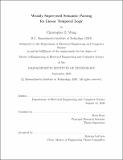Weakly supervised semantic parsing for Linear Temporal Logic
Author(s)
Wang, Christopher Z.
Download1227277980-MIT.pdf (897.6Kb)
Alternative title
Weakly supervised semantic parsing for LTL
Other Contributors
Massachusetts Institute of Technology. Department of Electrical Engineering and Computer Science.
Advisor
Boris Katz.
Terms of use
Metadata
Show full item recordAbstract
We train a semantic parser to discover latent meaning representations that can be used for the execution of natural language commands. We focus on the difficult domain of commands with a temporal aspect, whose semantics we capture using formulas in Linear Temporal Logic (LTL). Our parser learns using weak supervision, and does not have access to any ground truth representations during training; only execution demonstrations for each input command are observed. At training time, the parser hypothesizes a candidate formula for each input and updates its parameters according to the feedback of an executor. Our executor, a pre-trained planner, assigns a score to a hypothesis based on the likelihood of the corresponding execution traces. Three competing pressures allow our parser to learn. First, any hypothesized meaning for a sentence must be general enough to permit all behavior in the observed execution trajectories. Second, the executor rewards formulas which are more likely to have induced the specific behavior observed in the trajectories. Finally, a generator component, which reconstructs the input, encourages the model to conserve knowledge about the original command. On both human and machine generated sentences, we find that our weakly supervised approach performs at rates comparable to a fully supervised model when it comes to finding formulas that both reflect the observed demonstrations and elicit the correct executions from the planner.
Description
Thesis: M. Eng., Massachusetts Institute of Technology, Department of Electrical Engineering and Computer Science, September, 2020 Cataloged from student-submitted PDF of thesis. Includes bibliographical references (pages 51-55).
Date issued
2020Department
Massachusetts Institute of Technology. Department of Electrical Engineering and Computer SciencePublisher
Massachusetts Institute of Technology
Keywords
Electrical Engineering and Computer Science.